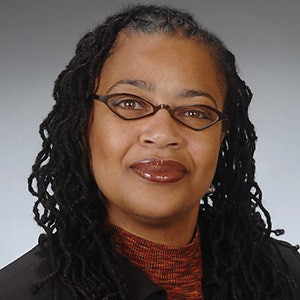A group of scholars have set out to change how marketing researchers understand how race, power and privilege affect marketplace policies and practices.
Through the creation of the Race in the Marketplace (RIM) Research Network, Drs. Sonya Grier, Kevin Thomas and Guillaume Johnson’s collaborative efforts seek to provide a transdisciplinary and international research space for scholars and scholar-activists studying the marketplace to link their work to a framework promoting “inclusive, fair and just marketplaces.”
“We hope that we can contribute to interventions that help to make the marketplace more equitable for everyone so that everyone has the same consumption opportunities,” said Grier, professor of marketing in the Kogod School of Business at American University. “There’s a lot to be learned from integrating perspectives from across disciplines and across groups.”
 Dr. Sonya Grier
Dr. Sonya GrierThe RIM network builds on the cross-disciplinary work of researchers in public health, economics, politics, sociology, psychology, communications and other fields. This is because the founding researchers noted the work already being done in these fields that conceptualized how race impacts areas such as advertising, health disparities and access to education and housing, for example.
“Ads are just the tip of the iceberg,” Grier said, “but marketing is also about access to products and goods. It’s about the pricing of products and goods and how they’re distributed, and what products and goods are available to different groups.”
Grier added that this critical analysis of race in the RIM network will be valuable because when race gets obscured in marketing research – often with coded words such as “identity,” “diversity” and “multiculturalism” – “the research may not be as relevant or as applicable to the particular problems or challenges that need to be addressed” for specific racial groups.
Failure to critically understand the dynamics of race in marketing may emerge in stereotypes about certain consumers such as in recent marketing controversies at H&M and Dove, or even result in violence such as in the 2014 police shooting death of John Crawford III – who was holding a toy BB gun air rifle – in a Walmart store in Ohio.
“That’s not only a violence-police issue, that’s also a marketplace issue. It relates to training of salespeople, to understanding in stores,” Grier said.
The network also will also consider the intersection of race and marketing globally with researchers contributing work from countries including the United Kingdom, Australia and France, the scheduled location of the 2019 Race in the Marketplace Research Forum.
Johnson, of the French National Center for Scientific Research (CNRS), said that in his own academic career, he noticed a void of scholarship on race in marketing in his home country, France. The word “race” is taboo there, he said, making it harder for scholars in the marketing field to even research ethnic marketing mostly because there were no statistics or data on ethnic groups.
He left France for South Africa to complete his Ph.D. nearly 15 years ago, but found that the subject of racial dynamics in the marketplace was still “highly controversial.” However, upon his return to France, he found that the discourse in the French marketing research community had evolved to use the term “ethnicity” more openly. “But the emphasis was mostly on the sociocultural dynamics versus the political dynamics,” Johnson said.
Thomas, a research affiliate at the Stan Richard School of Advertising & Public Relations at the University of Texas at Austin, observed that his cohort of business scholars largely approached the study of race in the marketplace from psychological perspectives. Those angles were helpful in some regards, he said, but they tended to overlook “sociopolitical aspects of the relationship between race and marketplaces.”
So network co-founders decided, Johnson said, “to develop RIM to put the emphasis on the political dimension.”
As the Network expands, Grier has found no data on how many business schools talk about race and public policy or offer courses related to multicultural or ethnic marketing. “We don’t know how students are being trained to address issues of race in marketplaces, but when I talk to a lot of my colleagues and business students, it doesn’t sound like it’s very common,” she said. “Everyone needs to jump in and engage in these issues. It can’t just be the one Black professor who talks about race in their class.”
The network – which has brought together 50 researchers and scholars since the inaugural RIM Forum last year – will be a space for new scholars to ask questions, receive support and engage with the work of other researchers across disciplines and perspectives, allowing better research to emerge on race in marketing, Grier said.
“I believe that interdisciplinarity will offer more in-depth knowledge on how to teach on what ‘race’ is and what ‘markets’ are,” Johnson said. “The international dimension of the network should provide rich examples on how ‘race’ and ‘markets’ depend on context.”
Added Thomas: “RIM’s transdisciplinary and international focus provides its members the opportunity to expose themselves to a host of effective teaching techniques yet to be realized in their given discipline.”
A call for book proposals will result in an edited book for various marketplace stakeholders, academics and students to have as a critical resource. Grier’s mentor – Dr. Jerome Williams, Distinguished Professor and Prudential Chair in Business, Provost of Rutgers-Newark and Executive Vice Chancellor – said he strongly supports her and the RIM Research Network.
“We’ve come a long way because there were times when in our academic journals, it was very difficult to get the editors and the reviewers to consider articles on race,” Williams said. “If you look at it today, I’m very pleased to see that we’ve made significant progress.”
That progress is still taking shape, and the network co-founders said they hope the network will increase the perceived legitimacy and importance of their field and continue to expand the research frontiers of the marketing field with a lasting impact.
“My hope is that the synergies that result from RIM’s transdisciplinary and international focus enable us – scholars, practitioners, policymakers, activists, and everyday citizens and consumers – to reimagine current marketplaces as well as invent new ones that are grounded in just and liberatory practices,” Thomas said.
Tiffany Pennamon can be reached at [email protected]. You can follow her on Twitter @tiffanypennamon.


















